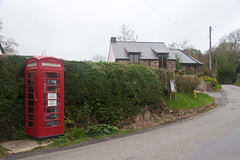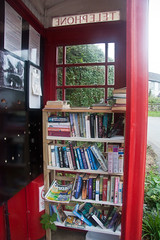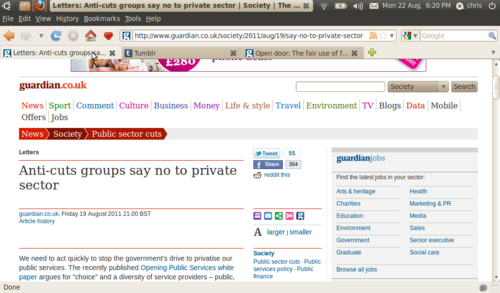I've done a blog post over
on my boring blog, and I'm going to explain myself here.
There've been riots all over London and the rest of England recently. It all started a few moments after I drove home through Tottenham Hale the other Thursday. This is what I reckon happened, armed police had been following Mark Duggan who was in a minicab. They stopped the vehicle, two officers approached the car from either side, it looked like Mark went for the gun he was carrying in a sock, one of the officers shouted, the other officer fired two bullets, one killed Mark, and the other went through Mark's arm, and hit the other officer, embedding itself in his radio.
Mark Duggan, Starrish Mark as his street name, was reported in the papers the next day as being "a well-respected family man", which I'm going to assume is journalistic shorthand for "scary gangster".
"family man" = gangster
"well-respected" = scary
As happens whenever the police kill anyone their investigation stops and the Independent Police Complains Commission conduct their own investigation. The main thing to remember about the IPCC is that they are independent from the police, you may be sceptical, but that's what they're called, they are not the police, for all intents and purposes, they are the Scooby Gang, a bunch of amateur investigators who aren't good enough to be proper investigators.
It was about a week after the shooting that a 'Fatal incident' board was put up at the scene, asking for witnesses.
So on Saturday when a crowd of folk from Mark's gang turn up at Tottenham police station demanding answers, all the police can say is 'no comment', cos they're not doing the investigation, they're not even allowed to investigate.
My favourite Xbox game is The Warriors, its based of the 1979 movie of the same name, about gangs of New York, some big gang leader organises a meeting and city-wide truce, pointing out that the gangs vastly outnumber of the police, and if they wanted to, the gangs could rule the streets, fortunately for New York, the gang leader was killed before it happened. In real life we were less fortunate, and Starrish Mark's death was a fine opportunity to declare a London-wide truce.
The violence was co-ordinated a little bit, folk arranged things on blackberry messenger, but by the second night it just spiraled out of the hands of gangs.
Anyhoo, in the weeks since, thousands of people have been arrested for violent disorder and looting and stuff. I reckon most of those people arrested are dopes, who didn't run away fast enough or cover their faces, or get the message broadcast that the police were on their way.
I don't honestly believe there's any deep-rooted reason for the rioting, none of
the 150 reasons expressed in the media really explain it. The reason for the breakdown of the rule of law that feels most accurate is the one given by
Kevin Sampson in Comment is Free in the Guardian, and that is cos its fun, its a buzz. Its the most honest reason there is, anything else its just someone else's agenda overheard and used as an excuse. Those drunk girls on the BBC clip who said it was fun, it was a giggle, oh yeah and its cos of teh government, the conservatives or whoever.
Bollocks.
Anyhoo,
my local MP in Walthamstow, Stella Creasy, is great, she was on a
Young Voters Question Time Special, arranged to help give young people a voice in the debate about the riots. The program was a disaster, everyone shouted over everyone else. The panalists were shouting over each other and shouting over the folk in the audience, the folk in the audience shouting over each other, and interupting everyone. It was terrible.
All it said to me was that young people don't know how to debate or how to express themselves.
Some young in the audience, tried to justify it "It sounds like we're angry, but we're just passionate." That's great but its no way to debate or expect people to listen to you, come back when you've read
Robert's Rules of Order.
One of the things that came out of the garbled noise of the debate was that young people feel they don't have a voice.
Well, I think that's just as much bullshit and people trying to use the riots as an excuse to force through their agenda as any of the draconian measures the Conservatives are trying.
I'll explain, I feel I don't have a voice either, I can't make a difference, I'm just a victim of circumstance.
But then again, if you're reading this blog, then I do have a voice, and people are listening.
So to prove that not having a voice is a bullshit excuse for the rioters, I have this idea which I have blogged about in my boring other blog:-
Its been a bit exciting round our way these past few weeks. I saw on telly, young people complaining that their voices were not being heard, and I empathized, sometimes I feel my voice isn't heard either.
I want to change all that, I want to help the young and neglected of Tottenham to have their voices heard, their opinions counted, and I have an idea.
I would get a some kind of grant from the government or Arts Council or some charity and I would open a shop on Tottenham High Road, and it would get a fresh lick of paint, some cheap computers and a sign that said "The Voices of Tottenham".
It would be like an internet cafe, but with a purpose, one singular purpose, I would invite in the youth of Tottenham and show them how to start blogging, how to sign up to blogger, or wordpress or tumblr or posterous. How to use hyperlinks, and upload photos, how to send email posts from their Blackberries. How to put in statcounter and see who is reading their blog.
I would be a mentor, a father figure, I would suggest things to write about, how to respond to comments, how to attract more visitors to their sites to get their voices heard far and wide.
What are your dreams, what are your aspirations, what do you want?
Been stopped and searched by the feds again, write about it, put up your side of the story first, get the badge number of the officer who stopped you. Graphs and tables.
What's on your mind? What did you do today? What are you going to do tomorrow?
Do something, write about it.
Nah, not setting up workshops in a library, or opening some kind of job center, connexions things. No, just presenting a tool, showing those with no voice how to get one, and then the whole world opens out.
It would give those disaffected the same voice that I have, the same means to express themselves, the same way to create and debate and engage.
I'm willing to give it a try, but I don't think it would work.
Sure we'd get free internet access from Haringay council, and a load of donated crap last decade computers, and the leccy bill and rent would be covered by some charitable grant, but I reckon within a month the computers would be nicked, the window smashed and the blogs and voices barely a murmur.



















